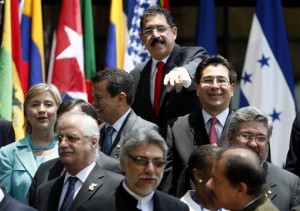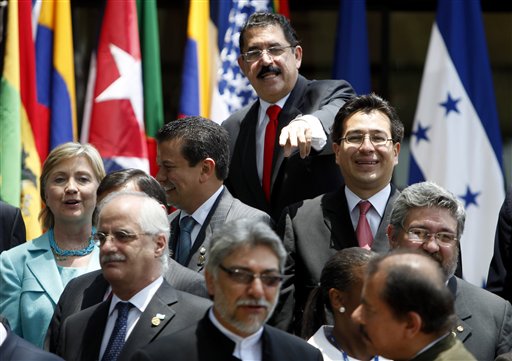SAN PEDRO SULA, Honduras (Reuters) – The Organization of American States lifted its 47-year suspension of Cuba yesterday in a move backed by Washington as it tries to soothe Cold War tensions with the communist-run island.
The 34-member hemispheric body, meeting in Honduras, unanimously scrapped a 1962 decision at the height of the Cold War that barred Cuba as revolutionary leader Fidel Castro took it toward communism and an alliance with the Soviet Union.
US President Barack Obama has taken steps toward a more open relationship with Cuba, lifting restrictions on travel and remittances to Cuba for Cuban-Americans with relatives on the island.
His administration had said Havana should not be allowed to return to the OAS until it embraces democratic principles and makes progress on human rights.
Cuba’s allies in Latin America instead called for Cuba to be allowed back in from the cold with no conditions, and Secretary of State Hillary Clinton came under heavy pressure at the OAS meeting here this week.
In a diplomatic compromise, the group’s member countries agreed that Cuba’s re-entry would be “the result of a process of dialogue begun at the request of the Cuban government and in line with the practices, purposes and principles of the OAS.”
That was an apparent reference to the group’s stated mission to defend democracy and human rights in the Western Hemisphere.
“We removed an historical impediment to Cuba’s participation in the OAS, but also established a process of engagement with Cuba,” US Assistant Secretary of State Thomas Shannon said.

Cuba has repeatedly said it has no interest in returning to the OAS. Before the OAS vote, former Cuban leader Fidel Castro described the body as an “accomplice” to crimes against Cuba, including a US economic embargo.
But Cuba’s leftist allies in the region pushed for the suspension to be lifted.
“The Cold War has ended today here in San Pedro Sula. We have made a wise and honorable decision,” Honduran President Manuel Zelaya said.
Despite opening up to Cuba, Obama has refused to drop the decades-old embargo on the island, saying its communist leaders need to free political prisoners and improve human rights and democracy.
Some Cuban exiles in Miami cheered the OAS vote as a way of forcing Cuba to embrace democracy.
“The United States has been able to pull off a brilliant diplomatic maneuver. Cuba has to comply with the requirements of the OAS including human rights and democracy,” said Joe Garcia, a director of the Cuban American National Founda-tion, a leading exile group.
The OAS move could allow Cuba to request loans from the Inter-American Development Bank although it was not clear if it would first have to apply for membership or if the lifting of the suspension would be enough.

